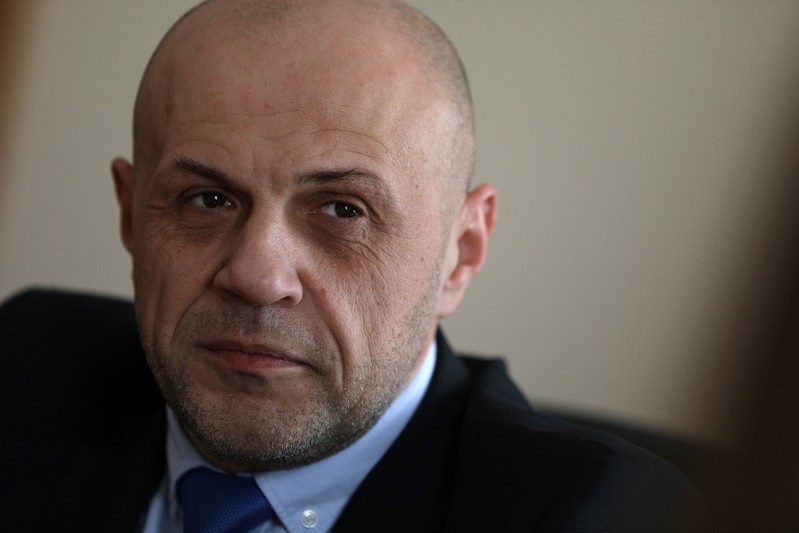
Bulgaria’s Deputy Prime Minister Tomislav Donchev speaks during an interview with Reuters in Sofia, Bulgaria March 29, 2018. REUTERS/Stoyan Nenov
March 30, 2018
By Alissa de Carbonnel and Tsvetelia Tsolova
SOFIA (Reuters) – Bulgaria needs more time to decide whether to follow NATO and EU allies in expelling Russian diplomats over a nerve agent attack on a former Russian spy, its deputy prime minister said on Thursday.
Bulgaria, current holder of the European Union’s presidency, recalled its ambassador from Moscow after the poisoning of Sergei Skripal and his daughter in England in the first known use of a military-grade nerve agent on European soil since World War Two.
But it has stopped short of following most EU members and allies in NATO, including the United States, which have expelled dozens of Russian diplomats in a show of solidarity with Britain over the March 4 attack.
“The political situation in Bulgaria is such that these types of decisions have to be taken by consensus,” deputy prime minister Tomislav Donchev told Reuters in an interview.
“At the moment, for good or bad, there is no such consensus,” he said.
The diplomatic standoff between the West and Russia has struck a raw nerve in Bulgaria, where one of the junior partners in the coalition government and also the opposition Socialists, favor pursuing good ties with Russia.
On Friday Prime Minister Boyko Borissov said the government has expressed its solidarity with its EU and NATO allies, but would not expel Russian diplomats for now as it needed to keep dialogue open with Moscow as an EU chair.
Bulgarian deputy foreign minister Juri Sterk met the Russian envoy to Sofia on Friday and expressed Sofia’s serious concerns over the reports of a possible link of persons and organizations from Russia and the use of a nerve agent in England.
Separately, further highlighting the sensitivity of the issue for the coalition, the government issued a statement saying Donchev had not made any “assessments” about the government’s stance regarding the parties to the Skripal case.
“BARBARIC” ATTACK
Bulgaria, which was liberated from Ottoman Turkish rule by Russia, became one of the most obedient Soviet satellite states during the Cold War. Many Bulgarians feel a strong cultural affinity for Russia, with which they share the Cyrillic script and Orthodox Christianity.
This legacy translates into a coalition government in which the center-right GERB party shares power with three smaller nationalist parties which to varying degrees support better ties with Russia and argue that Bulgaria should take a balanced position over the Skripal case.
They have opposed a call by a senior GERB official for Bulgaria to follow the lead of its allies and expel Russian diplomats.
Both President Rumen Radev and the biggest opposition party, the Socialists, are also insisting that more concrete proof is needed of Russian involvement in the Skripal poisoning.
“I categorically think these (calls for Bulgaria to expel Russian diplomats) are a mistake,” said Volen Siderov, leader of the pro-Russian, nationalist Attack party, one of GERB’s junior coalition partners.
“We have one unclear case. We have no evidence of Russia’s participation,” he said in a statement.
Donchev said in his interview that any action undertaken by Bulgaria would be seen as a signal of solidarity with Britain and its allies and also as a signal to Russia.
Touching on the domestic political situation, he said: “Taking into account that our government is a coalition… I am not convinced that such a decision can be taken so easily and so quickly.”
Donchev said Bulgaria would wait for a report from the Organisation for the Prohibition of Chemical Weapons, adding that Sofia was monitoring developments closely.
“What happened in Great Britain is … unacceptable. It is barbaric, it is a chemical weapon, it is a military toxic substance,” Donchev said.
Referring to Bulgaria’s history of close ties with Russia, Donchev said: “This is an undeniable fact. History, though, is sometimes a good, and sometimes a bad, teacher in politics.”
(Additional reporting by Angel Krasimirov; Editing by Richard Balmforth and Gareth Jones)

